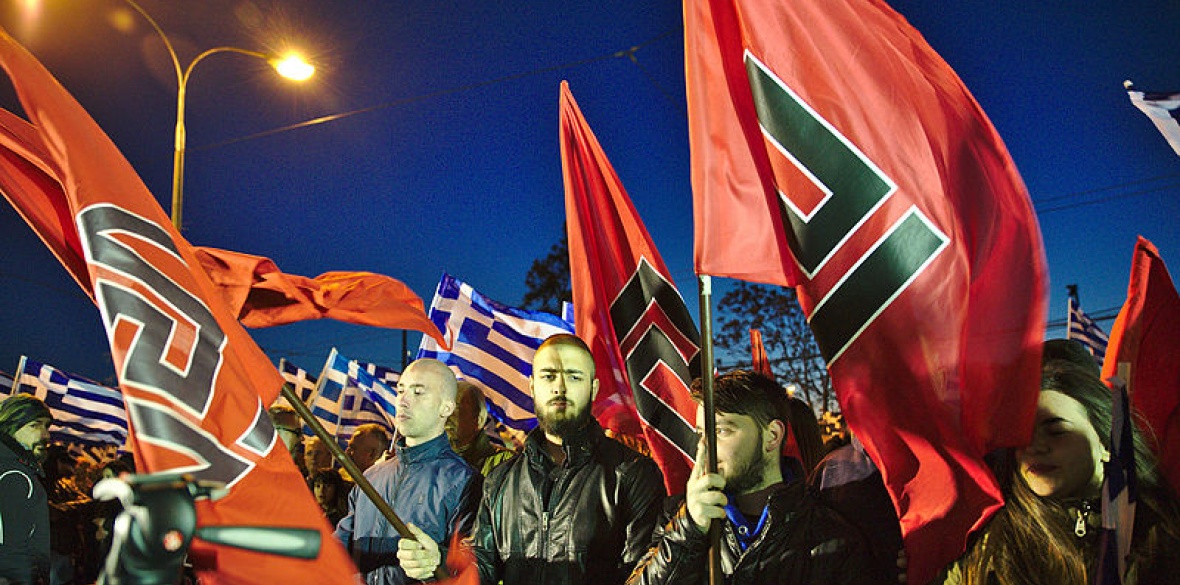This is the last article you can read this month
You can read more article this month
You can read more articles this month
Sorry your limit is up for this month
Reset on:
Please help support the Morning Star by subscribing here
THOUSANDS were set to gather outside the central court in Athens on Wednesday to hear the long-awaited verdicts in the trial of Greek neonazi party Golden Dawn.
It is the biggest trial of nazi criminality since Nuremberg and later processes following the second world war. It ranks in Greek history alongside the hearings after the fall of the junta in 1974 of top officers responsible for the military coup of 1967.
A huge amount rests upon the outcome, not only for Greece but also for the anti-fascist movement on both sides of the Atlantic. If acquitted, Golden Dawn will receive €8 million of state funding held back over the last seven years while the investigation and then trial of it as a criminal organisation took place.
If the 68 defendants, who include the entire leadership of now former MPs, are convicted, then it will be a blow to all those on the far right who took inspiration from Golden Dawn’s neonazi strategy.
For four years in austerity-ravaged Greece it successfully combined major electoral advance with terrorising neighbourhoods, immigrants and the labour movement with its “battalion squads” of armed gangs.
It is not merely a right-wing nationalist party. It is a neonazi organisation.
“We are the seeds of the defeated army of 1945,” its leader Nicolaos Michaloliakos told a private party meeting — that is, of the defeated army of Hitler’s Third Reich.
And that is but a grain of the mountain of evidence the court has received over the last five-and-a-half years.
Indeed, one reason the process has taken so long is the volume of documents and testimony against the accused. The other is that the defence strategy has been delay and disruption. It is now the end of that road.
There ought to be no doubt about the verdicts on charges of murder, attempted murder, other felonies, and membership and direction of a criminal organisation. It is a criminal trial, not a trial of ideas.
It is brought under the same law whereby mafia bosses are prosecuted for directing the work of underlings.
Three instances of that “work” are part of this trial: the murder of anti-racist rapper Pavlos Fyssas, and the attempted murders of Egyptian fisherman Abouzid Embarak and of communist trade union leader Sotiris Poulikogiannis.
The choice of victims is revealing — and the court heard about many others in already decided cases. A radical cultural figure; an immigrant worker; and a union leader in the shipyards of Piraeus.
While criminal actions not ideas are at the heart of this trial, the lawyers representing the victims have demonstrated that the nazi ideology and organisation at the core of Golden Dawn explain the choice of targets, the intention and overall motivation linking scores of crimes.
That there is any dubiety about the verdict is not due to the strength of Golden Dawn’s legal defence. Its 50 lawyers had to cut their witness list from 240 to 70 as one after another incriminated others or infuriated the judges.
It is down to the intervention of the state prosecutor. Their role in the Greek system is not to represent the victims but the interests of the state in the court. The prosecutor’s proposal in this case brought national outcry.
She said the court should dismiss the charge of criminal organisation, that crimes were committed by discrete individuals — nothing to do with Golden Dawn, and that only the thug who stabbed Fyssas should be convicted — not even those who held the victim down.
Last weekend official politics finally reflected public indignation. All the parliamentary leaders issued statements urging conviction.
Communist Party leader Dimitris Koutsoumpas spoke for the radical left as a whole who have isolated Golden Dawn through mass anti-fascist activity — local, party and initiatives such as the KEERFA coalition.
But also opposing the neonazis was former prime minister Antonis Samaras, whose hard-right government paved the way for Golden Dawn’s rise eight years ago and was engaged in back channel collaboration with it.
What to make of such hypocrisy and last-minute conversion? Anti-fascist lawyer Thanasis Kampagiannis explains: “We built this democratic wall: the unions, neighbourhood collectives, immigrant organisations, the left … And we know who in official politics is the first to abandon the battlements or open the rear gate to the enemy.
“But we built the democratic wall. And it is we who shall defend it.”
That is a message that should resonate everywhere whatever the Greek state and its judiciary decide in Athens today.











